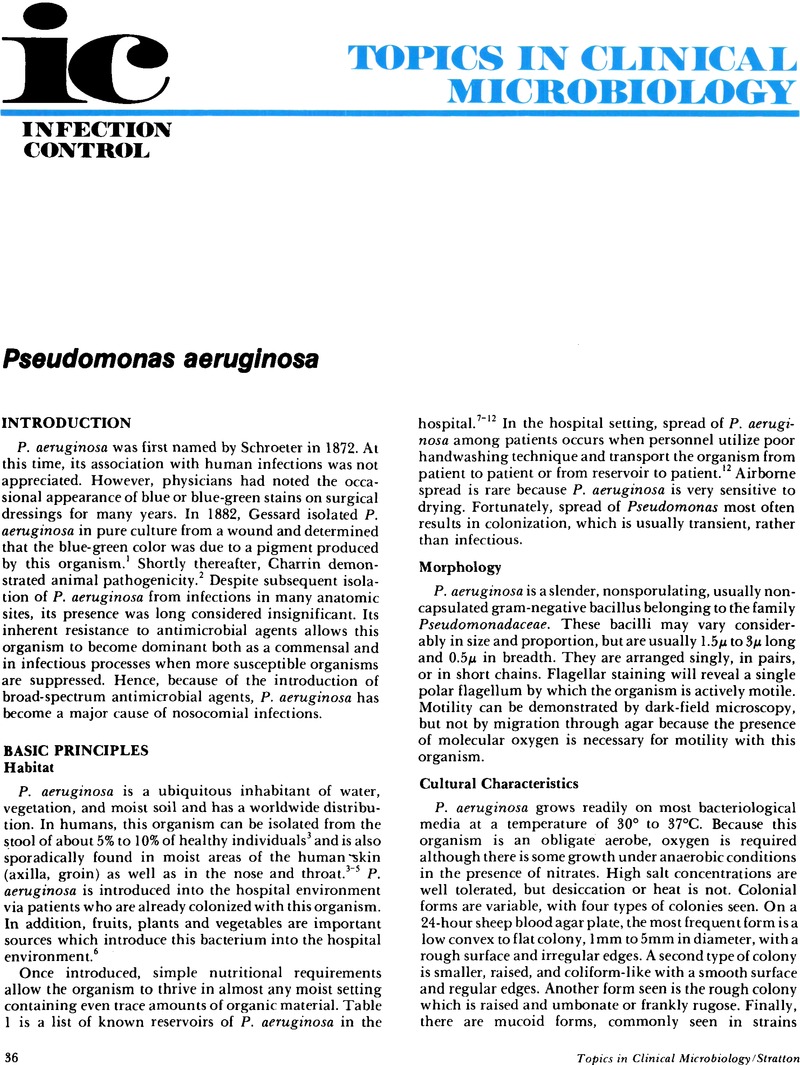Crossref Citations
This article has been cited by the following publications. This list is generated based on data provided by Crossref.
Evans, Martin E.
1985.
Topics in Clinical Microbiology:Francisella tularensis.
Infection Control,
Vol. 6,
Issue. 9,
p.
381.
Stratton, Charles W.
1990.
Pseudomonas aeruginosa Revisited.
Infection Control & Hospital Epidemiology,
Vol. 11,
Issue. 2,
p.
101.
Wortman, Paul D.
1993.
Bacterial infections of the skin.
Current Problems in Dermatology,
Vol. 5,
Issue. 6,
p.
197.
Maher, W E
Kobe, M
and
Fass, R J
1993.
Restriction endonuclease analysis of clinical Pseudomonas aeruginosa strains: useful epidemiologic data from a simple and rapid method.
Journal of Clinical Microbiology,
Vol. 31,
Issue. 6,
p.
1426.
Kerr, J.R.
Moore, J.E.
Curran, M.D.
Graham, R.
Web, C.H.
Lowry, K.G.
Murphy, P.G.
Wilson, T.S.
and
Ferguson, W.P.
1995.
Investigation of a nosocomial outbreak of Pseudomonas aeruginosa pneumonia in an intensive care unit by random amplification of polymorphic DNA assay.
Journal of Hospital Infection,
Vol. 30,
Issue. 2,
p.
125.
Hernandez, Javier
Ferrus, Maria A.
Hernandez, Manuel
and
Alonso, Jose L.
1997.
Comparison of six different methods for typing Pseudomonas aeruginosa strains isolated from bottled and well waters.
Water Research,
Vol. 31,
Issue. 12,
p.
3169.
LAHIRI, KK
1998.
EVALUATION OF HOSPITAL ACQUIRED PSEUDOMONAS INFECTION IN PARAPLEGIC AND ORTHOPAEDIC CASES.
Medical Journal Armed Forces India,
Vol. 54,
Issue. 1,
p.
23.
Verma, Pratishtha
Singh, Neha
and
Anand, Sanjeev
2021.
Short communication: A competitive exclusion study reveals the emergence of Bacillus subtilis as a predominant constitutive microorganism of a whey reverse osmosis membrane biofilm matrix.
Journal of Dairy Science,
Vol. 104,
Issue. 1,
p.
221.
Chen, Dongyun
Pan, Yicong
Yu, Huan
and
Chen, Xiaoxiang
2024.
Simple and sensitive detection of
Pseudomonas aeruginosa
in neonatal infection based on a both-end blocked peroxidase-mimicking DNAzyme
.
BioTechniques,
Vol. 76,
Issue. 7,
p.
323.
Huang, Lu
Zhang, Ye
Liu, Jie
Zhang, Dalin
and
Li, Li
2024.
A Label-Free Fluorescent Amplification Strategy for High-Sensitive Detection of Pseudomonas aeruginosa based on Protective-EXPAR (p-EXPAR) and Catalytic Hairpin Assembly.
Journal of Microbiology and Biotechnology,
Vol. 34,
Issue. 7,
p.
1544.
Li, Ju
Wang, Yunkang
Liu, Pei
Zhang, Yuanqing
Yang, Yufan
Zhao, Shuang
He, Junfeng
Zhao, Cheng
Jia, Xu
and
Zhang, Lin
2024.
Trends and implications of antimicrobial resistance in Pseudomonas aeruginosa: Insights from a 19-year study in Zhejiang Province.
Medicine,
Vol. 103,
Issue. 46,
p.
e40606.



